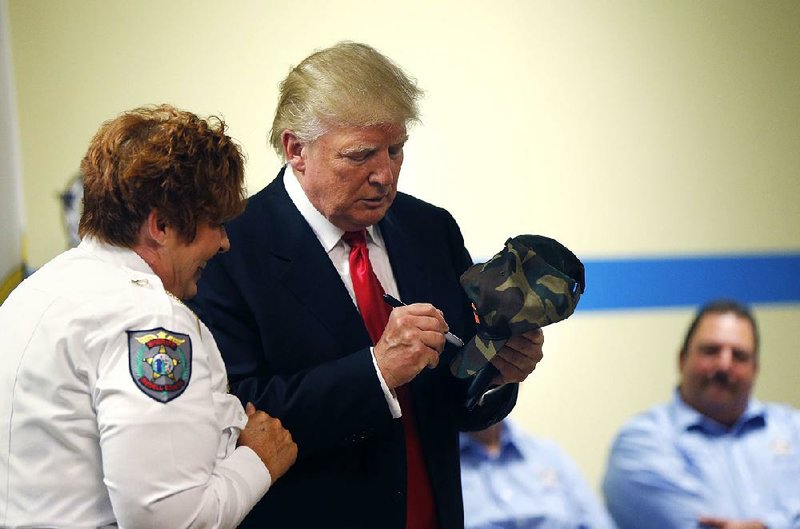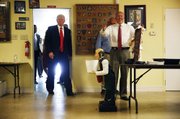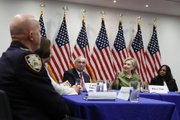CHARLOTTE, N.C. -- Republican presidential nominee Donald Trump acknowledged that his comments may have caused people pain, saying he regrets some of what he's said "in the heat of debate."
A day after announcing a campaign shake-up, the New York businessman said he recognized that some of his comments may have been ill-advised.
"Sometimes in the heat of debate and speaking on a multitude of issues, you don't choose the right words or you say the wrong thing. I have done that," Trump, reading from prepared text, said at a rally in Charlotte, N.C. "And believe it or not, I regret it -- and I do regret it -- particularly where it may have caused personal pain."
He added that, "Too much is at stake for us to be consumed with these issues." As the crowd cheered, Trump pledged to "always tell you the truth."
Trump worked to appeal directly to nonwhite voters.
"I will not rest until children of every color in this country are fully included in the American dream," Trump told his audience, again accusing Democratic nominee Hillary Clinton of "bigotry."
Clinton, he claimed, "sees communities of color only as votes and not as human beings worthy of a better future."
He urged black voters to give him a chance, saying: "What do you have to lose by trying something new?"
Clinton's campaign brushed the speech off as just words he read from a teleprompter.
"Donald Trump literally started his campaign by insulting people. He has continued to do so through each of the 428 days from then until now, without shame or regret," said spokesman Christina Reynolds in a statement.
But Trump supporters largely accepted the change of tone, even if some saw it as unnecessary.
"It takes a lot of strength to say, 'I'm sorry, ' to admit -- not that he was wrong, but he wished he hadn't done it," said Cindy Ammons, 70, a Trump supporter from Spindale, N.C.
"I think he's evolving," she said.
New leadership team
The remarks came after Trump announced an overhaul of his campaign's leadership, bringing in a new chief executive officer and appointing a new campaign manager.
Trump tapped media executive Stephen Bannon to serve as chief executive officer of his presidential bid. Republican pollster Kellyanne Conway filled the campaign manager position left vacant since Trump fired his former campaign chief, Corey Lewandowski, almost two months ago.
That new team on Thursday moved to put nearly $5 million in battleground state advertising as the Republican presidential contender took steps to address campaign challenges in those states.
The New York businessman's campaign reserved television ad space over the coming 10 days in Florida, North Carolina, Ohio and Pennsylvania, according to Kantar Media's political ad tracker. While Clinton has spent more than $75 million on advertising in 10 states since locking up her party's nomination, Trump's ad buy marks his first of the general election season.
Election Day is Nov. 8 but early voting in the first states is set to begin in five weeks.
Conway insisted Thursday that the new team would help refocus the nominee, without sacrificing the authenticity that fueled his successful primary campaign.
"We're going to sharpen the message," Conway told CNN. "We're going to make sure Donald Trump is comfortable about being in his own skin -- that he doesn't lose that authenticity that you simply can't buy and a pollster can't give you. Voters know if you're comfortable in your own skin."
Trump trails Clinton in preference polls of most key battleground states. His party leaders, even at the Republican National Committee, have said they may divert resources away from the presidential contest in favor of vulnerable Senate and House candidates if things don't improve.
Trump is spending at least $1.4 million in Florida, $1 million in Pennsylvania, about $831,000 in North Carolina and $746,000 in Ohio, according to Kantar Media. His biggest single-market investment comes in the Philadelphia area.
"That is the most direct route to 270," said Chris Young, Republican National Committee field director. "Those states are critical on that pathway."
Trump's campaign has benefited from outside political groups. One, called Rebuilding America Now, has spent about $9 million in the past few weeks. The National Rifle Association's political arm has put more than $4 million into anti-Clinton messages.
But those amounts pale in comparison to the $31 million the pro-Clinton super political action committee Priorities USA has spent on-air since mid-June. That's just one of several groups helping her.
'Bridge our divides'
Earlier Thursday in North Carolina, Trump stopped by a gun range before meeting with police officers in Iredell County.
"I'm on your side a thousand percent," Trump said during the meeting with a Fraternal Order of Police chapter in Statesville.
"I gotta say this man can shoot," county Sheriff Darren Campbell said of Trump, who is licensed to carry a handgun in New York.
Clinton met with law enforcement leaders in New York City days after Trump accused her of being "against the police" after a police shooting in Wisconsin.
Clinton called on Americans to be "clear-eyed" about the country's challenges.
"It's obvious that recent events -- from Dallas and Baton Rouge to Milwaukee and across the country -- underscore how difficult and important the work is ahead of us to repair the bonds of trust and respect between our police officers and our communities," Clinton said during a private session at New York's John Jay College of Criminal Justice. "We have to be clear-eyed about the challenges we face. We can't ignore them, and certainly we must not inflame them."
She added: "We need to work together to bridge our divides, not stoke even more divisiveness."
Trump has cast himself as the "law and order" candidate in the race, including during a speech Tuesday in the predominantly white city of West Bend, Wis., about an hour outside of Milwaukee.
Clinton, however, has expressed support for law enforcement but also sympathizing with the concerns of Black Lives Matter activists and others angered by police conduct that has led to the deaths of black people.
"I want to support them -- our police officers -- with the resources they need to do their jobs," Clinton said. "I believe supporting our police officers and improving policing go hand in hand. Everyone is safer when there is respect for the law and when everyone is respected by the law."
Clinton added that she believes there is an opportunity to work together to address "legitimate questions" in order to "keep our communities safe, to protect lives and property while also respecting every single American."
The officials present at the meeting with Clinton represented a group of about 200 current and former police leaders, prosecutors and attorney generals from across the country who advocate policies that reduce crime and incarceration.
Law Enforcement Leaders to Reduce Crime and Incarceration also recently sent a letter to Clinton and Trump asking both candidates to advocate for policies that reduce crime and imprisonment.
Global Initiative to end
As the campaign pushes toward November, former President Bill Clinton announced the family's foundation would stop accepting foreign and corporate donations if Hillary Clinton is elected president. The former president also said the foundation will end its annual Clinton Global Initiative meeting regardless of the outcome of the November election.
Bill Clinton made the announcement at an afternoon meeting with Clinton Foundation staff members, according to participants who spoke on condition of anonymity ahead of the formal announcement.
Members of the Clinton Foundation board met earlier in the day to ratify the changes.
Clinton said the foundation plans to continue its work, but intends to refocus its efforts in a process that will take up to a year to complete. The former president, who turns 70 today, said he will resign from the board, and the foundation will accept contributions only from U.S. citizens and independent charities.
It no longer would take money from any foreign entity, government, foreign or domestic corporations, or corporate charities. A Clinton spokesman said the former president also will refrain from delivering paid speeches until the November election and will stop giving paid speeches if Hillary Clinton is elected president.
At the staff meeting, Clinton said he and his daughter, Chelsea, did not face any external pressure to make the changes, but wanted to avoid any potential issues or second-guessing for Hillary Clinton should she move into the White House.
The charitable network, founded after Bill Clinton left office in 2001, has raised more than $2 billion for initiatives focused on global health, climate change, economic development and increasing opportunities for women and girls.
While Hillary Clinton stepped down from its board after beginning her 2016 campaign, her husband and daughter have remained in leadership roles, prompting questions about the ability of the organization to continue its work should Clinton win the White House.
Some of the group's funding has come from foreign donations and political donors to the Clinton family. Money accepted from countries such as Saudi Arabia drew scrutiny from both Republicans and Democrats early in Clinton's presidential bid.
When Clinton served as secretary of state, the foundation reached an agreement with the Obama administration to prohibit, or in some cases curtail, foreign donations to its programs.
After she left the State Department, the foundation resumed accepting donations from overseas. Bowing to pressure in April 2015, the group announced that it would restrict donations to only six Western nations and disclose its donors more frequently.
Information for this article was contributed by Steve Peoples, Julie Bykowicz, Jill Colvin and Lisa Lerer, Ken Thomas of The Associated Press and by John Wagner and Abby Phillip of The Washington Post.
A Section on 08/19/2016


